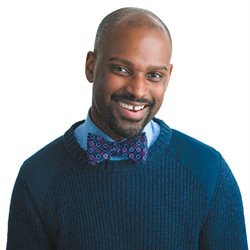
Auditioning 101: What Are They Looking For?
Posted Friday, September 30th 2016 by Arbender Robinson
I already know what you are thinking. The wheels are spinning and the corners of your mouth are creeping into a smile.
New York Acting Coaching is your premier source for acting coaching, audition preparation, and acting tips. Follow us on instagram at @NewYorkActingCoaching.
I already know what you are thinking. The wheels are spinning and the corners of your mouth are creeping into a smile…
Do you think that I have the magical answer to the question that you ask yourself at every audition? Even I, who tries to hit at least one audition every day, still ask myself, “What are they looking for?”
Why? Because, like you, I’m an actor. We want to excite, inspire, affect, and, ultimately, please the audience. Once you’re cast in a show, doing the show is the easy part. If you have questions about your character or concerns about your performance, you have an entire rehearsal process with the director, who is there to answer questions and set you on the path to creating your best work. Furthermore, you have production elements (music, dialogue, sets, costumes, lights, etc.) to take your performance to the next level. Unfortunately, you get neither the benefit of top-notch (or any-notch) production elements in an audition, nor do you get to ask the director for any guidance.
You can’t walk into the audition room and cut to the chase: “What are you looking for?” First of all, it’s borderline rude. Besides, the people auditioning you may not even know what exactly it is they’re looking for beyond the break-down check list (“blonde,” “tall,” “nerdy”); therefore, asking, “What are you looking for?” wouldn’t be helpful to you in the moment anyway.
Regardless of who is auditioning you, though, rest assured they recognize what they’re looking for when they see it.
But what is it? What are they looking for?
The answer might not be the one you’re looking for, but I can boldly say that it’s the best answer; the surest way to make the casting directors stop writing and look up; and the secret weapon to acing audition after audition. This answer is the stuff of gurus! (Was that too dramatic? What were you looking for?)
You. They are looking for you. You are the solution to their casting dilemma. Not just you, but the best possible version of you.
Begin by looking like the best you when you walk into the audition room. Excellent health is part of the job description. You don’t have to be a paragon of physical fitness, but you need a basic level of strength and stamina to be considered for the demands of a standard show schedule. Dress well, clean and neat. Look like a well-tuned instrument, and so much of the work will be done for you as soon as you walk in.
Fully realize your audition material. Treat your audition like a miniature performance. Log the hours studying the material. Know your audition pieces inside and out. Spend time studying, investigating every acting choice. Set your imagination free to live in the world that you have created. (Remember the acting playground I’ve mentioned before?)
Know and accept that the best version of you does not paraphrase, forget a line, or try out new audition material without exhaustive study. The best version of you is prepared, ready to work, and therefore, free and available to seek active choices and take and implement direction.
Auditioners recognize the best you when he or she enters the room and begins their audition. The best you at work demands attention without having to ask for it. The best you forgets to consider what they are looking for and plays the scene, song, or monologue. The best you actually enjoys his or her time in the audition room!
I teach an audition technique class at New York Vocal Coaching, and I give challenges to my students – anything from learning a song in ten minutes to taking on a new character I throw at them. Lately, I’ve asked them to prepare cattle-call auditions, or 60-90 second auditions presented to a room of many theatre companies for a specific show or for an entire theatre season. For example, I asked my students to prepare two songs that could, would, and should give a casting agent every reason to cast them in a season of the shows Next To Normal, Carousel, Smokey Joe’s Café, and (the made-up musical version of) Steel Magnolias.
The task is seemingly impossible, but the results are consistent: students discover that they can’t be perfect for every show or company. All they can do is focus on their strengths as an artist, prepare thoroughly, and present the best possible version of him or herself.
Theatre evolves. Audiences change. The demands of a show shift. What is required of actors remains constant: be you. Prepare, develop, and be the best you possible.

Arbender Robinson
Musical Theatre Associate
Arbender Robinson is currently the Musical Theatre Coaching Associate at New York Vocal Coaching, and Co-Director of New York Acting Coaching. No stranger to the stage, Mr. Robinson has appeared in ten (10) Broadway musicals. He made his Broadway debut in the Tony Award winning production of Hairspray; where he covered the role of Seaweed. In the original cast of Disney’s The Little Mermaid he covered the role of Prince Eric. He also served as the Dance Captain and Swing for the Broadway revival of Hair and appeared in the Broadway revival of Ragtime. His credits continue with Disney’s The Lion King, one of Broadway’s longest running and all-time highest grossing show. Later, he was in the original cast of Beautiful- The Carole King Musical and the 2014 revival of Les Miserables and as the cover for Marius. He is also the first African American to ever play Marius on Broadway. Arbender was also in the original cast of Shuffle Along and performed with many Broadway Legends including Audra McDonald and Brian Stokes Mitchell. The list of legends continue with Director George C Wolfe and Choreographer Savion Glover.

Let Your Tongue Die!
The singer in front of me looked back, questioning my sanity. Of course, I didn't actually mean die, nor did I mean for her to sing with her tongue flopping out of her mouth, hilarious as that might be. No, what we were seeking was tongue...

Am I Singing In Tune? More Complicated Than You Think!
Virtually every singer I have taught or worked with has struggled with singing in tune at some point in their vocal journey...

"WHY" Do We Sing?
At first thought, this question may seem far too simple or far too philosophical for a conversation about improving one's performance. I assure you, it is neither. As evident in my prior articles, I have gone...